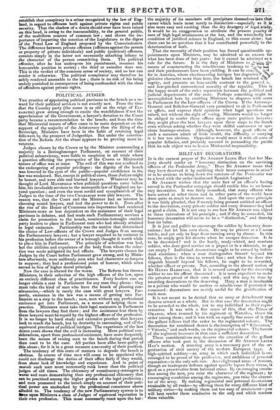MILITARY DECORATIONS.
IT is the earnest prayer of Sir ANDREW LEITH HAY that her Ma- jesty should confer an " honorary distinction on the surviving officers of the Peninsular Arm)." Does Sir ANDREW mean that they have deserved it by outliving their brave compeers in arms ? or is he anxious to bring down the veterans of the Peninsular war to a level with the order-bedizened Spanish Legionists?
Sir ANDREW wishes that the mere fact of an officer's having served in the Peninsular campaign should entitle hint to an hono- rary decoration. It was fairly remarked, that many officers who have served at other times and in other parts of the world have done quite as much to deserve one. And upon the same principle it was fairly pleaded, that if merely being present entitled an officer to the decoration, every private soldier and every drummer-boy had as good a claim. It is not easy to see how Sir ANDREW can object to these extensions of his principle ; and if they be conceded, his honorary decoration will cease to be a "distinction," and thereby lose its value.
It is just and politic to encourage the soldier by honorary deco-
rations ; but let him earn them. He may be present at a f mous battle, and yet only be kept from running away by shame. In this case, he amply gets his deserts when he escapes detection. Is lie to be decorated ? and is the hardy, ready-witted, and resolute soldier, who does good service on a piquet or in a skirmish, to go out empty ? Individual decorations ought to be earned by indivi- dual exertions : when a man distinguishes himself beyond his fellows, then is the time to reward him ; and when he does dis- tinguish himself beyond his fellows, he ought to be rewarded, whether officer or private. Not, according to the absurd notion of Sir HENRY HARDINGE, that it is reward enough for the deserving soldier to see his officer decorated : it is most expedient to make the privates proud of their own rank; and this may be done by awarding decorations to the deserving. Many a man is invaluable as a private who would be useless or mischievous if promoted to command: decorations are mainly useful for the gratification of such men.
It is not meant to be denied that an army or detachment may deserve reward as a whole. But in that case the decoration ought to be awarded to the whole, not to any individual as their repre- sentative. It was with a fine sense of this, that the Prince of ORANGE, when rescued by his regiment at Waterloo, threw his order among them; and it was with an equally fine sense of it that the gallant fellows tied the order to the regimental colours. The decoration for combined desert is the inscription of" Salamanca," "Vittoria," and such words, on the regimental colours. The button of the regiment becomes in that case a sufficient decoration. These considerations may deserve the attention of the gallant
officers who took part in the discussion of Sir ANDREW LEITH HAY'S motion. A standing army is a necessary part of the or- ganization of civil society of the modern European type. A high-spirited soldiery—an army in which each individual is en- couraged to be proud of his profession, and ambitious of personal reputation—is the only safe one. An enlightened sense of honour, though an inadequate defence against specific lapses from virtue, is good as a preservative from habitual crime. By encouraging emula- tion among the men, you raise the character of the regiment ; by encouraging emulation among the regiments, you raise the charac- ter of the army. By making regimental and personal decorations attaluable by all ranks—by offering them for every different kind of military virtue—by making them not too easy of attainment—you will best render them conducive to the only end which renders them valuable.


























 Previous page
Previous page